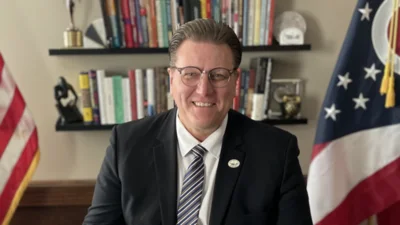As the county’s top legal officer, Knox County Prosecutor Chip McConville finds himself involved in the contentious debate surrounding industrial solar projects in Knox County, providing legal counsel to local townships and commissioners regarding the exclusionary zone resolutions that seek to prohibit them.
“I told the townships, 'Look, I'm not the decision maker here, you guys are,'” McConville told the Mount Vernon News. “You bear the responsibility for whether or not you're going to vote for or against any kind of particular project. Now, you know there are ups and downs to either side of that, but that's a political issue, it's not a legal issue.”
Township trustees previously told Mount Vernon News that McConville had cautioned townships against passing exclusionary zone resolutions. However, McConville said, “words were put in my mouth” by trustees.
McConville added that his advice was against passing resolutions prohibiting solar developments, not resolutions requesting the Knox County Commission disallow industrial solar development.
“Townships cannot adopt resolutions that ban solar facilities,” he said. “They just simply don't have the legal authority to do that. The only sure legal authority for that is with the county commissioners.”
McConville's legal counsel on the matter has sparked concern among some stakeholders.
In response to McConville's stance, Todd Roese of Knox Smart Development said he’d heard many township officials were advised against anti-industrial solar resolutions.
“I've spoken to a few different township trustees from different townships and a number of them have said that they got specific advice from (McConville) that the resolution for their township of making their township an exclusionary zone for industrial solar is just an absolute waste of time,” Roese said. “They say we got that straight from Chip, that the resolution is useless and pretty much a waste of time.”
Roese said trustees being dissuaded from signing resolutions based on McConville's advice weakens the community-wide effort against industrial solar.
“Having townships sign that resolution goes a long way to telling the Power Siting Board that we don't want that here,” he said. “And so by Chip (McConville) going and telling people that this resolution is useless, it's kind of defeating that whole movement, if you will.”
McConville said he initially reached out to all of Knox County’s townships on the matter after being requested to do so by the Knox County Commission.
That was back in January.
Knox County Commissioner Thom Collier, who has since lost re-election, said at the time the Commission would request resolutions be passed by townships.
“We have asked Chip McConville to reach out to all of the townships,” Collier said at the time. “Any township that wants their township to be in an exclusionary zone should forward their resolution to the commissioners no later than February. We will hold a public meeting and allow any township to be an exclusionary zone if that is the preference of their constituents.”
Since then, 18 townships and the City of Mount Vernon have passed exclusionary zones. However, no public meeting has been announced.
In 2022, the Knox County Commission initially voted to allow industrial solar development in the county.
The Ohio Power Siting Board is in its final stages of the permitting process for the nearly 1,400-acre Frasier Solar Project.
The OPSB has held three hearings in Knox County regarding the Frasier Solar Project on April 4, May 23 and May 29 at Knox Memorial Theater.
An adjudicatory hearing is scheduled for Aug. 19 at 10 a.m. at the Offices of the Public Utilities Commission in Columbus.






